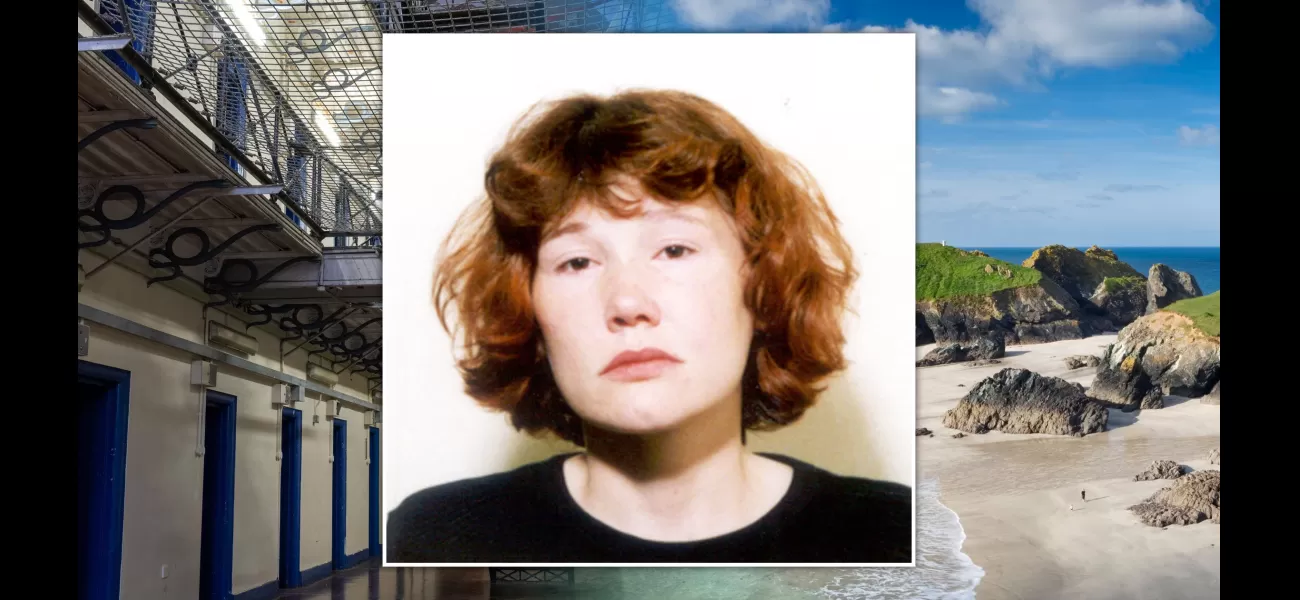Maxine Carr, who was released from prison in 2004, now spends her days walking in the countryside with her husband.
Maxine Carr was freed from jail two decades ago.
May 14th 2024.

Maxine Carr, a woman whose name has become synonymous with one of Britain's most notorious crimes, was granted lifelong anonymity when she was released from prison 20 years ago. It was a decision meant to protect her from the public's judgment and the potential danger she faced as a result of her involvement in the tragic events of August 2002.
On that fateful day, the small town of Soham was rocked by the disappearance of two young girls, Holly Wells and Jessica Chapman. As the community came together to mourn their loss, the police were closing in on their killer, school caretaker Ian Huntley, and his girlfriend Maxine Carr.
Despite their initial attempts to hide their involvement in the girls' murders, the truth eventually came to light. Huntley was sentenced to life in prison, while Carr received a 42-month sentence for conspiring to pervert the course of justice. After serving half her sentence, Carr was released on May 14, 2004, with the added protection of lifelong anonymity.
Born in Grimsby, Lincolnshire, Carr had met Huntley at a nightclub in 1999. Their relationship was described as emotionally abusive, and they eventually moved to Soham when Huntley got a job at a local college. It was there that Carr also found work at St Andrew's Primary School, where she would meet Holly and Jessica.
As the investigation into the girls' disappearance intensified, Carr stood by Huntley's side, even going as far as to provide a false alibi for him. However, as evidence mounted against the couple, Carr's lies were exposed, and she was arrested. During the trial, she pleaded guilty to perverting the course of justice, but not guilty to assisting an offender, claiming she had been manipulated by Huntley.
Despite her attempts to distance herself from the heinous crime, Carr became a hate figure in the eyes of the public. She was held in Holloway Prison, where she was kept away from other inmates for her own safety. Upon her release, she faced further danger, leading to her request for lifelong anonymity.
The High Court granted her request, citing the risk to her fragile psychological state. This made Carr the first criminal in British history to receive such an order without being directly involved in a killing. The order remains in place to this day, protecting her new identity and whereabouts.
Life after Huntley has not been easy for Carr. She reportedly underwent plastic surgery and changed her appearance to avoid recognition. In 2008, she became engaged to a man who was described as accepting her past and being "besotted" with her. They lived more than 60 miles apart, enjoying the simple pleasures of life, such as going for walks in the countryside.
Today, Carr is 47 years old and continues to live a life of anonymity, far from the public eye. She serves as a reminder that even in the darkest of times, there can be a glimmer of hope and a chance for redemption.
Twenty years have passed since Maxine Carr was granted lifelong anonymity upon her release from prison on May 14, 2004. The decision was made to protect her "fragile psychological state," as she had played a role in one of the most horrific crimes in recent history.
It all began on August 19, 2002, when the small town of Soham, Cambridgeshire was rocked by the news of the disappearance of best friends Holly Wells and Jessica Chapman. As the community came together to mourn their loss, police arrested school caretaker Ian Huntley and his girlfriend, Maxine Carr, on suspicion of murder.
It was later revealed that Huntley had lured the girls into his home and ultimately took their lives. In a desperate attempt to cover his tracks, he even joined in the search efforts for the missing girls and gave interviews to the press. Meanwhile, Carr plastered missing person posters on the window of their home.
However, their suspicious behavior soon caught the attention of the police. Huntley openly admitted to being the last person to see the girls alive, while Carr referred to one of them in the past tense. The discovery of burned clothing matching the outfits the girls were last seen in further solidified their involvement in the crime.
After a trial, Huntley was given a double life sentence for the murder of Holly and Jessica, while Carr was convicted of conspiring to pervert the course of justice and sentenced to three and a half years in jail.
Upon her release in 2004, Carr was granted lifelong anonymity, a decision that was met with much controversy as it was the first time such a measure was given to someone not directly involved in the crime. It was done in order to protect her from potential harm, as she had already become a target for hate and violence.
Born in Grimsby, Lincolnshire in 1977, Carr had met Huntley in 1999 and moved in with him shortly after. When the girls went missing, she initially claimed to have been at home with him, but later admitted to lying and revealed that she had been visiting her mother at the time. She was held at the infamous Holloway Prison while awaiting trial, where she became a target for violence from other inmates.
After serving 21 months of her initial 42-month sentence, Carr was released on probation in 2004. She applied for anonymity under the Human Rights Act, citing the danger to her life, and it was granted by the High Court. This meant that no details about her new identity, including her location and occupation, could be published.
Similar protection had been given to other notorious criminals such as Jon Venables and Robert Thompson, who murdered toddler James Bulger, and Mary Bell, who committed murders as a child. However, Carr's situation was unique as she was the first criminal not directly involved in a killing to receive anonymity. The order will remain in place until her death, unless the court decides to lift it.
Carr has since reportedly undergone plastic surgery and changed her appearance in order to avoid being recognized. In 2008, she got engaged to a man who "accepted her past" and the couple lived a quiet, normal life, away from the media and public eye.
As the 20-year mark since her release approaches, Maxine Carr remains a controversial figure, with some arguing that she should not have been granted anonymity while others believe it was necessary for her safety. Her involvement in the tragic events of August 19, 2002 will forever be a haunting chapter in her life.
On that fateful day, the small town of Soham was rocked by the disappearance of two young girls, Holly Wells and Jessica Chapman. As the community came together to mourn their loss, the police were closing in on their killer, school caretaker Ian Huntley, and his girlfriend Maxine Carr.
Despite their initial attempts to hide their involvement in the girls' murders, the truth eventually came to light. Huntley was sentenced to life in prison, while Carr received a 42-month sentence for conspiring to pervert the course of justice. After serving half her sentence, Carr was released on May 14, 2004, with the added protection of lifelong anonymity.
Born in Grimsby, Lincolnshire, Carr had met Huntley at a nightclub in 1999. Their relationship was described as emotionally abusive, and they eventually moved to Soham when Huntley got a job at a local college. It was there that Carr also found work at St Andrew's Primary School, where she would meet Holly and Jessica.
As the investigation into the girls' disappearance intensified, Carr stood by Huntley's side, even going as far as to provide a false alibi for him. However, as evidence mounted against the couple, Carr's lies were exposed, and she was arrested. During the trial, she pleaded guilty to perverting the course of justice, but not guilty to assisting an offender, claiming she had been manipulated by Huntley.
Despite her attempts to distance herself from the heinous crime, Carr became a hate figure in the eyes of the public. She was held in Holloway Prison, where she was kept away from other inmates for her own safety. Upon her release, she faced further danger, leading to her request for lifelong anonymity.
The High Court granted her request, citing the risk to her fragile psychological state. This made Carr the first criminal in British history to receive such an order without being directly involved in a killing. The order remains in place to this day, protecting her new identity and whereabouts.
Life after Huntley has not been easy for Carr. She reportedly underwent plastic surgery and changed her appearance to avoid recognition. In 2008, she became engaged to a man who was described as accepting her past and being "besotted" with her. They lived more than 60 miles apart, enjoying the simple pleasures of life, such as going for walks in the countryside.
Today, Carr is 47 years old and continues to live a life of anonymity, far from the public eye. She serves as a reminder that even in the darkest of times, there can be a glimmer of hope and a chance for redemption.
Twenty years have passed since Maxine Carr was granted lifelong anonymity upon her release from prison on May 14, 2004. The decision was made to protect her "fragile psychological state," as she had played a role in one of the most horrific crimes in recent history.
It all began on August 19, 2002, when the small town of Soham, Cambridgeshire was rocked by the news of the disappearance of best friends Holly Wells and Jessica Chapman. As the community came together to mourn their loss, police arrested school caretaker Ian Huntley and his girlfriend, Maxine Carr, on suspicion of murder.
It was later revealed that Huntley had lured the girls into his home and ultimately took their lives. In a desperate attempt to cover his tracks, he even joined in the search efforts for the missing girls and gave interviews to the press. Meanwhile, Carr plastered missing person posters on the window of their home.
However, their suspicious behavior soon caught the attention of the police. Huntley openly admitted to being the last person to see the girls alive, while Carr referred to one of them in the past tense. The discovery of burned clothing matching the outfits the girls were last seen in further solidified their involvement in the crime.
After a trial, Huntley was given a double life sentence for the murder of Holly and Jessica, while Carr was convicted of conspiring to pervert the course of justice and sentenced to three and a half years in jail.
Upon her release in 2004, Carr was granted lifelong anonymity, a decision that was met with much controversy as it was the first time such a measure was given to someone not directly involved in the crime. It was done in order to protect her from potential harm, as she had already become a target for hate and violence.
Born in Grimsby, Lincolnshire in 1977, Carr had met Huntley in 1999 and moved in with him shortly after. When the girls went missing, she initially claimed to have been at home with him, but later admitted to lying and revealed that she had been visiting her mother at the time. She was held at the infamous Holloway Prison while awaiting trial, where she became a target for violence from other inmates.
After serving 21 months of her initial 42-month sentence, Carr was released on probation in 2004. She applied for anonymity under the Human Rights Act, citing the danger to her life, and it was granted by the High Court. This meant that no details about her new identity, including her location and occupation, could be published.
Similar protection had been given to other notorious criminals such as Jon Venables and Robert Thompson, who murdered toddler James Bulger, and Mary Bell, who committed murders as a child. However, Carr's situation was unique as she was the first criminal not directly involved in a killing to receive anonymity. The order will remain in place until her death, unless the court decides to lift it.
Carr has since reportedly undergone plastic surgery and changed her appearance in order to avoid being recognized. In 2008, she got engaged to a man who "accepted her past" and the couple lived a quiet, normal life, away from the media and public eye.
As the 20-year mark since her release approaches, Maxine Carr remains a controversial figure, with some arguing that she should not have been granted anonymity while others believe it was necessary for her safety. Her involvement in the tragic events of August 19, 2002 will forever be a haunting chapter in her life.
[This article has been trending online recently and has been generated with AI. Your feed is customized.]
[Generative AI is experimental.]
0
0
Submit Comment





